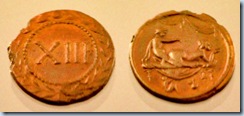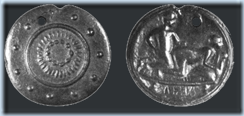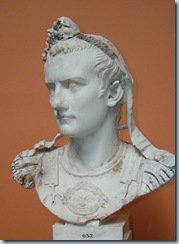Gaius Caesar Germanicus, commonly known as Caligula, was emperor of Rome from 37-41 A.D., and in four short years established a reputation for strange behavior which has endured for 20 centuries. Son of the Roman general Germanicus, Caligula was raised among Roman troops and got the nickname Caligula ("Little Boots") from his miniature military garb. After the death of his great uncle Tiberius, Caligula became emperor with the army's support. During the first months of his reign he distributed the legacies left by Tiberius and Livia to the Roman people, and after the austerity which Tiberius had practiced the games and chariot races Caligula held were welcomed. He was respectful to the Senate, adopted his cousin Tiberius Gemellus as his son and heir, and recalled political exiles who had been banished during the reigns of his predecessors.
 Caligula was a deeply disturbed child well before he became emperor. As a child, he witnessed Tiberius torture and kill his family in front of him. He was also forced to serve as one of Tiberius’s “minnows.” When Caligula became emperor, he had all of the “minnows” drowned for their depravity. He
Caligula was a deeply disturbed child well before he became emperor. As a child, he witnessed Tiberius torture and kill his family in front of him. He was also forced to serve as one of Tiberius’s “minnows.” When Caligula became emperor, he had all of the “minnows” drowned for their depravity. He  banned the practice of spintriae, a Roman token, possibly for brothels, usually depicting sexual acts or symbols. (They may have been used to pay prostitutes, who at times spoke a different language. In other words, “I want you to do what is on this silver coin.”)
banned the practice of spintriae, a Roman token, possibly for brothels, usually depicting sexual acts or symbols. (They may have been used to pay prostitutes, who at times spoke a different language. In other words, “I want you to do what is on this silver coin.”)
 But by the spring of 38 the character of Caligula's rule changed drastically. An illness late in 37 seems to have seriously affected his mind. Suetonius claims that, after the illness, Caligula succumbed completely to the role of Oriental despot. In all things he became arbitrary and cruel. He murdered, among others, Tiberius Gemellus, humiliated the Senate, and spent money recklessly. He revived treason trials so that he could confiscate the property of the convicted. Caligula's extravagances included building a temple to himself in Rome and appointing his favorite horse as high priest. His years as emperor were marked by erratic behavior and debauchery: Caligula ordered the deaths of enemies and friends alike, threw absurdly lavish parties, practiced incest with his sisters, and generally abused power while mishandling or ignoring affairs of state. He was assassinated in the year 41 by soldiers from his own Praetorian Guard. Caligula was succeeded by his uncle Claudius. According to the historian Suetonius, Caligula lavished his horse Incitatus with jewelry, built him a marble stall and planned to make him consul. Caligula apparently suffered from epilepsy as a boy; some scholars think his later behavior was the result of schizophrenia. The 1979 movie Caligula featured Malcolm McDowall as the emperor and a screenplay by Gore Vidal.
But by the spring of 38 the character of Caligula's rule changed drastically. An illness late in 37 seems to have seriously affected his mind. Suetonius claims that, after the illness, Caligula succumbed completely to the role of Oriental despot. In all things he became arbitrary and cruel. He murdered, among others, Tiberius Gemellus, humiliated the Senate, and spent money recklessly. He revived treason trials so that he could confiscate the property of the convicted. Caligula's extravagances included building a temple to himself in Rome and appointing his favorite horse as high priest. His years as emperor were marked by erratic behavior and debauchery: Caligula ordered the deaths of enemies and friends alike, threw absurdly lavish parties, practiced incest with his sisters, and generally abused power while mishandling or ignoring affairs of state. He was assassinated in the year 41 by soldiers from his own Praetorian Guard. Caligula was succeeded by his uncle Claudius. According to the historian Suetonius, Caligula lavished his horse Incitatus with jewelry, built him a marble stall and planned to make him consul. Caligula apparently suffered from epilepsy as a boy; some scholars think his later behavior was the result of schizophrenia. The 1979 movie Caligula featured Malcolm McDowall as the emperor and a screenplay by Gore Vidal.
From Suetonius The Lives of the Twelve Caesars:
 Caligula was a deeply disturbed child well before he became emperor. As a child, he witnessed Tiberius torture and kill his family in front of him. He was also forced to serve as one of Tiberius’s “minnows.” When Caligula became emperor, he had all of the “minnows” drowned for their depravity. He
Caligula was a deeply disturbed child well before he became emperor. As a child, he witnessed Tiberius torture and kill his family in front of him. He was also forced to serve as one of Tiberius’s “minnows.” When Caligula became emperor, he had all of the “minnows” drowned for their depravity. He  banned the practice of spintriae, a Roman token, possibly for brothels, usually depicting sexual acts or symbols. (They may have been used to pay prostitutes, who at times spoke a different language. In other words, “I want you to do what is on this silver coin.”)
banned the practice of spintriae, a Roman token, possibly for brothels, usually depicting sexual acts or symbols. (They may have been used to pay prostitutes, who at times spoke a different language. In other words, “I want you to do what is on this silver coin.”)  But by the spring of 38 the character of Caligula's rule changed drastically. An illness late in 37 seems to have seriously affected his mind. Suetonius claims that, after the illness, Caligula succumbed completely to the role of Oriental despot. In all things he became arbitrary and cruel. He murdered, among others, Tiberius Gemellus, humiliated the Senate, and spent money recklessly. He revived treason trials so that he could confiscate the property of the convicted. Caligula's extravagances included building a temple to himself in Rome and appointing his favorite horse as high priest. His years as emperor were marked by erratic behavior and debauchery: Caligula ordered the deaths of enemies and friends alike, threw absurdly lavish parties, practiced incest with his sisters, and generally abused power while mishandling or ignoring affairs of state. He was assassinated in the year 41 by soldiers from his own Praetorian Guard. Caligula was succeeded by his uncle Claudius. According to the historian Suetonius, Caligula lavished his horse Incitatus with jewelry, built him a marble stall and planned to make him consul. Caligula apparently suffered from epilepsy as a boy; some scholars think his later behavior was the result of schizophrenia. The 1979 movie Caligula featured Malcolm McDowall as the emperor and a screenplay by Gore Vidal.
But by the spring of 38 the character of Caligula's rule changed drastically. An illness late in 37 seems to have seriously affected his mind. Suetonius claims that, after the illness, Caligula succumbed completely to the role of Oriental despot. In all things he became arbitrary and cruel. He murdered, among others, Tiberius Gemellus, humiliated the Senate, and spent money recklessly. He revived treason trials so that he could confiscate the property of the convicted. Caligula's extravagances included building a temple to himself in Rome and appointing his favorite horse as high priest. His years as emperor were marked by erratic behavior and debauchery: Caligula ordered the deaths of enemies and friends alike, threw absurdly lavish parties, practiced incest with his sisters, and generally abused power while mishandling or ignoring affairs of state. He was assassinated in the year 41 by soldiers from his own Praetorian Guard. Caligula was succeeded by his uncle Claudius. According to the historian Suetonius, Caligula lavished his horse Incitatus with jewelry, built him a marble stall and planned to make him consul. Caligula apparently suffered from epilepsy as a boy; some scholars think his later behavior was the result of schizophrenia. The 1979 movie Caligula featured Malcolm McDowall as the emperor and a screenplay by Gore Vidal. From Suetonius The Lives of the Twelve Caesars:
He lived in habitual incest with all his sisters, and at a large banquet he placed each of them in turn below him, while his wife reclined above. Of these he is believed to have violated Drusilla when he was still a minor, and even to have been caught lying with her by his grandmother Antonia, at whose house they were brought up in company. Afterwards, when she was the wife of Lucius Cassius Longinus, an ex-consul, he took her from him and openly treated her as his lawful wife; and when ill, he made her heir to his property and the throne. When she died, he appointed a season of public mourning, during which it was a capital offence to laugh, bathe, or dine in company with one's parents, wife, or children. He
was so beside himself with grief that suddenly fleeing the city by night and traversing Campania, he went to Syracuse and hurriedly returned from there without cutting his hair or shaving his beard. And he never afterwards took oath about matters of the highest moment, even before the assembly of the people or in the presence of the soldiers, except by the godhead of Drusilla. The rest of his sisters he did not love with so great affection, nor honor so highly, but often prostituted them to his favorites; so that he was the readier at the trial of Aemilius Lepidus to condemn them, as adulteresses and privy to the conspiracies against him; and he not only made public letters in the handwriting of all of them, procured by fraud and seduction, but also dedicated to Mars the Avenger, with an explanatory inscription, three swords designed to take his life.
He respected neither his own chastity nor that of anyone else. He is said to have had unnatural relations with Marcus Lepidus, the pantomimic actor Mnester, and certain hostages. Valerius Catullus, a young man of a consular family, publicly proclaimed that he had violated the emperor and worn himself out in commerce with him. To say nothing of his incest with his sisters and his notorious passion for the concubine Pyrallis, there was scarcely any woman of rank whom he did not approach. These as a rule he invited to dinner with their husbands, and as they passed by the foot of his couch, he would inspect them critically and deliberately, as if buying slaves, even putting out his hand and lifting up the face of anyone who looked down in modesty; then as often as the fancy took him he would leave the room, sending for the one who pleased him best, and returning soon afterwards with evident signs of what had occurred, he would openly commend or criticize his partner, recounting her charms or defects and commenting on her conduct. To some he personally sent a bill of divorce in the name of their absent husbands, and had it entered in the public records.
In reckless extravagance he outdid the prodigals of all times in ingenuity, inventing a new sort of baths and unnatural varieties of food and feasts; for he would bathe in hot or cold perfumed oils, drink pearls of great price dissolved in vinegar, and set before his guests loaves and meats of gold, declaring that a man ought either to be frugal or Caesar. He even scattered large sums of money among the commons from the roof of the basilica Julia for several days in succession. He also built Liburnian galleys with ten banks of oars, with sterns set with gems, particoloured sails, huge spacious baths, colonnades, and banquet-halls, and even a great variety of vines and fruit trees; that on board of them he might recline at table from an early hour, and coast along the shores of Campania amid songs and choruses. He built villas and country houses with utter disregard of expense, caring for nothing so much as to do what men said was impossible. 3 So he built moles out into the deep and stormy sea, tunneled rocks of hardest flint, built up plains to the height of mountains and razed mountains to the level of the plain; all with incredible dispatch, since the penalty for delay was death. To make a long story short, vast sums of money, including the 2,700,000,000 sesterces which Tiberius Caesar had amassed, were squandered by him in less than the revolution of a year.


No comments:
Post a Comment